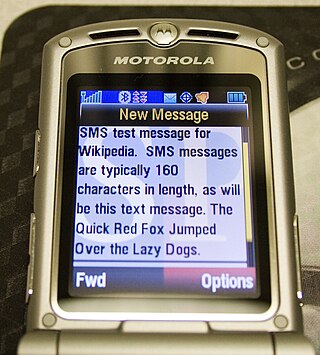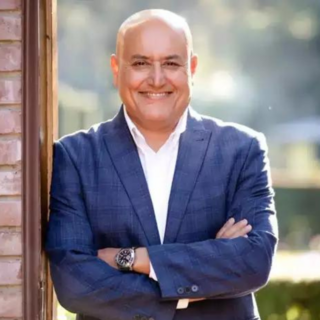
Short Message Service, commonly abbreviated as SMS, is a text messaging service component of most telephone, Internet and mobile device systems. It uses standardized communication protocols that let mobile phones exchange short text messages, typically transmitted over cellular networks.
Voice over Internet Protocol (VoIP), also called IP telephony, is a method and group of technologies for voice calls for the delivery of voice communication sessions over Internet Protocol (IP) networks, such as the Internet.

Sabeer Bhatia is an Indian businessman who co-founded the first free web-based email service, Hotmail.com in 1996. In 2021 he co-founded ShowReel with his co-founder Aji Abraham. ShowReel initially focused on connecting users through short videos for job seekers and founders. But now it has turned into an AI-powered learning platform.
Premium-rate telephone numbers are telephone numbers that charge callers higher price rates for select services, including information and entertainment. A portion of the call fees is paid to the service provider, allowing premium calls to be an additional source of revenue for businesses. Tech support, psychic hotlines, and adult chat lines are among the most popular kinds of premium-rate phone services. Other services include directory enquiries, weather forecasts, competitions and ratings televoting. Some businesses, e.g. low-cost airlines, and diplomatic missions, such as the US Embassy in London or the UK Embassy in Washington, have also used premium-rate phone numbers for calls from the general public.

A telephone call or telephone conversation, also known as a phone call or voice call, is a connection over a telephone network between the called party and the calling party. Telephone calls started in the late 19th century. As technology has improved, a majority of telephone calls are made over a cellular network through mobile phones or over the internet with Voice over IP. Telephone calls are typically used for real-time conversation between two or more parties, especially when the parties cannot meet in person.
A toll-free telephone number or freephone number is a telephone number that is billed for all arriving calls. For the calling party, a call to a toll-free number from a landline is free of charge. A toll-free number is identified by a dialing prefix similar to an area code. The specific service access varies by country.

A public-safety answering point (PSAP), sometimes called a public-safety access point, is a type of call center where the public's telephone calls for first responders are received and handled. It takes calls from any landline, mobile phone line, or VoIP line. It can also happen that when 112 is dialed in then a logic is implemented by mobile or network operators to route the call to the nearest police station. Such call centers exist in most countries to answer calls to an emergency telephone number. Trained telephone operators are also usually responsible for dispatching these emergency services. Most PSAPs are now capable of caller location for landline calls, and many can handle mobile phone locations as well, where the mobile phone company has a handset to location system. Some can also use voice broadcasting where outgoing voice mail can be sent to many phone numbers at once, in order to alert people to a local emergency such as a chemical spill.
GSM services are a standard collection of applications and features available over the Global System for Mobile Communications (GSM) to mobile phone subscribers all over the world. The GSM standards are defined by the 3GPP collaboration and implemented in hardware and software by equipment manufacturers and mobile phone operators. The common standard makes it possible to use the same phones with different companies' services, or even roam into different countries. GSM is the world's most dominant mobile phone standard.
In Argentina, area codes are two, three, or four digits long. Local customer numbers are six to eight digits long. The total number of digits is ten, for example, phone number (11) 1234-5678 for Buenos Aires is made up of a 2-digit area code number and an 8-digit subscriber's number, while (383) 123-4567 would be an example of a Catamarca number.

936 140-35-67 dialling plan for mobile networks and new landline operators is closed; all subscriber numbers must be dialled in full. For landline numbers starting with 02, the dialling plan used to be open; the trunk digit and area code could be omitted if the caller was in the same area code as the callee. However, starting May 3, 2008, all landline numbers must be dialled in full.
International telephone calls are those made between different countries. These telephone calls are processed by international gateway exchanges (switches). Charges for these calls were high initially but declined greatly during the 20th century due to advances in technology liberalization. Originally they were placed via long-distance operators. The calls were transmitted by cable, communications satellite, radio, and more recently, fiber optics and Voice over Internet Protocol (VoIP). International direct dialling was introduced in the 1970s, so calls can be dialed by country code without an operator.

Google Voice is a telephone service that provides a U.S. phone number to Google Account customers in the U.S. and Google Workspace customers in Canada, Denmark, France, the Netherlands, Portugal, Spain, Sweden, Switzerland, the United Kingdom and the contiguous United States. It is used for call forwarding and voicemail services, voice and text messaging, as well as U.S. and international calls. Calls are forwarded to the phone number that each user must configure in the account web portal. Users can answer and receive calls on any of the phones configured to ring in the web portal. While answering a call, the user can switch between the configured phones. Subscribers in the United States can make outgoing calls to domestic and international destinations. The service is configured and maintained by users in a web-based application, similar in style to Google's email service Gmail, or Android and iOS applications on smartphones or tablets.
Yahoo Voice was a Voice over Internet Protocol (VoIP), PC-PC, PC-Phone and Phone-to-PC telecommunications service. It was provided by Yahoo via its Yahoo Messenger instant messaging application.
Skype offers a number of features based around calling, messaging, video chat, and file and screen sharing. The following is a partial list of Skype's features:

Ribbit was a telecommunications company based in Mountain View, California. It was acquired by BT Group on July 29, 2008, for $105 million.
Iristel is a Canadian provider of telecommunication services that is a competitive local exchange carrier (CLEC). The company was founded in 1999 and is headquartered in Markham, Ontario.
A virtual number, also known as direct inward dialing (DID) or access numbers, is a telephone number without a directly associated telephone line. Usually, these numbers are programmed to forward incoming calls to one of the pre-set telephone numbers, chosen by the client: fixed, mobile or VoIP. A virtual number can work like a gateway between traditional calls (PSTN) and VoIP.
Mobile Dialer is a software application installed and used on mobile phones. Various software providers offer branded mobile dialers. They are used to make VoIP calls from a mobile hand set. The "Mobile Dialer" or "Mobile VoIP Dialer" uses SIP signaling and can be mapped to a Softswitch or an IP device to work a device for voice communication. Newer mobile dialers also allow users to originate a Voice Call or SMS using their mobile handset. In many countries, VoIP is considered as "illegal Business" and is banned by the government. Mobile Dialer application can run behind network address translation (NAT) and on private IP and can pass through firewalls or blocked networks when combined with tunneling software.

Google Hangouts was a cross-platform instant messaging (IM) service developed by Google. It originally was a feature of Google+, becoming a standalone product in 2013, when Google also began integrating features from Google+ Messenger and Google Talk into Hangouts. Google then began integrating features of Google Voice, its Internet telephony product, into Hangouts, stating that Hangouts was designed to be "the future" of Voice.

Upptalk was a proprietary voice-over-IP service and software application that provided mobile phone numbers in the cloud and allows users to call or text any phone for free whether or not the device receiving the calls and texts has the Yuilop application. The service was discontinued in 2017 and even its domain was abandoned. Upptalk, formerly known as Yuilop, is officially transitioning to an Edtech company.







